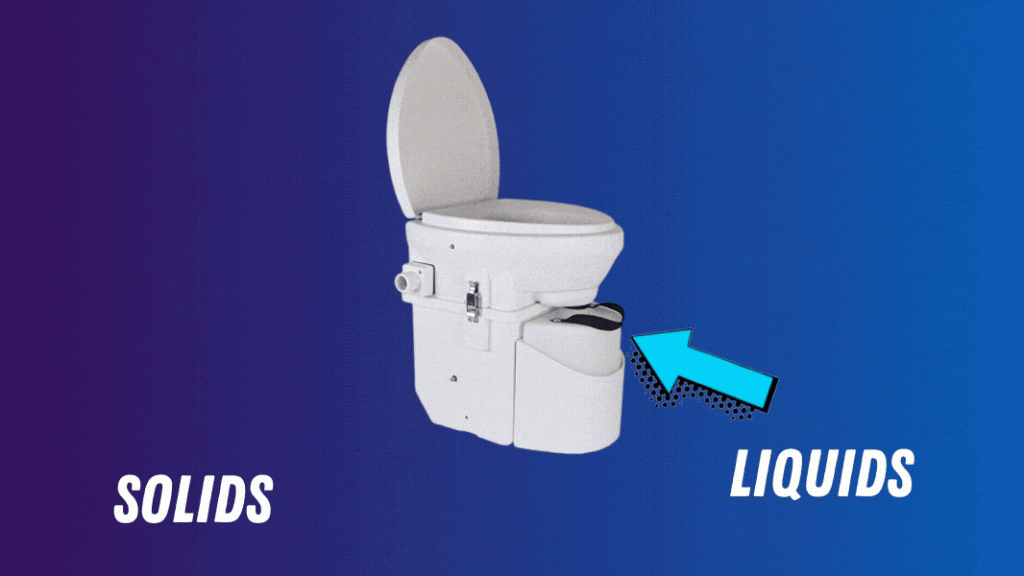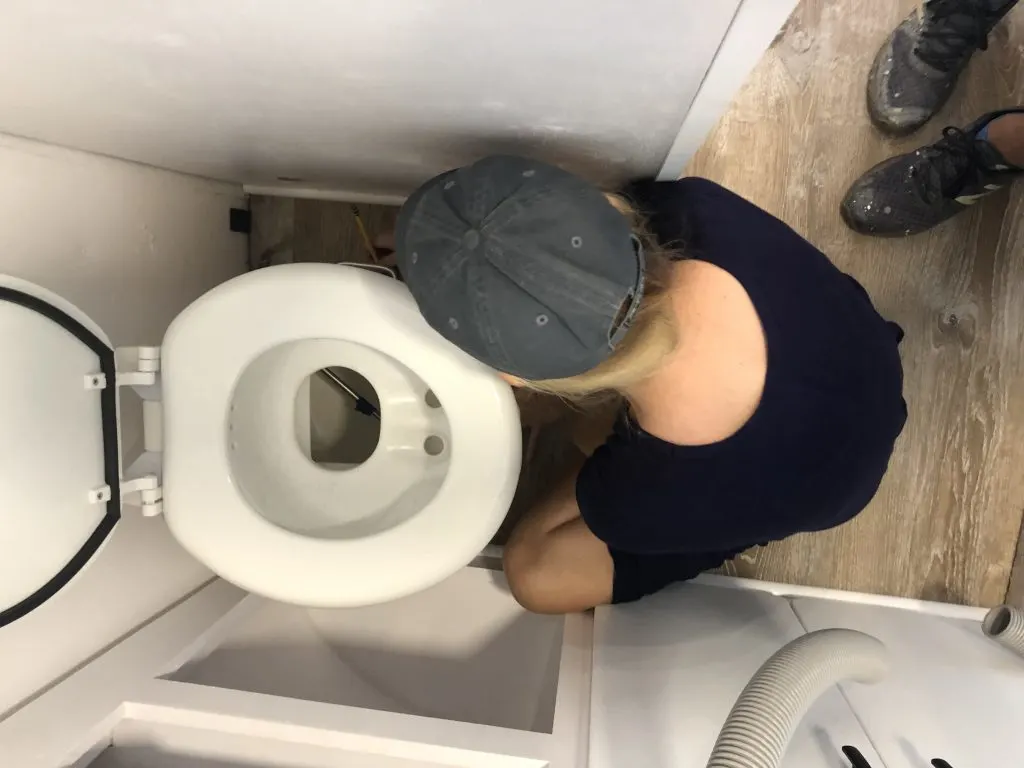Sometimes distance makes the heart grow fonder. In the case of RV composting toilets, there’s no truth in that sentiment.
My wife and I began full-time RV life five years ago. From day one, we used a composting toilet. Now that we’ve transitioned from full-time to part-time RVers, the composting toilet life has become glaringly less attractive.
Before we shed too much nasty truth about composting toilets, let us explain what an RV composting toilet is and give them a little credit.
What Is An RV Composting Toilet?
An RV composting toilet differs from traditional RV toilets because it uses no external holding tanks. Instead, it’s a glorified bucket.
In fact, an RV composting toilet is two buckets. There’s one compartment for solids and one compartment for liquids. This separation is critical to its functionality.
A composting medium is used as the base of the solid compartment. Coconut coir is the most common base material. The composting process slowly begins when your #2 is introduced to the coco-coir.
A liquid compartment captures urine and stores it separately.

The Benefits of RV Composting Toilets
We decided to use a composting toilet for extended off-grid camping. Both of our RVs were small. This means the black tank would have to be emptied every five days or so.
The RV composting toilet allowed us to camp off the grid for up to 14 days without disposing of our waste.
Composting toilets are also environmentally friendly. They don’t use any water for flushing.
Now let’s dive into the dirty truths!
#1 They DO Smell
Composting toilets do have a unique smell. And as they fill, the smell increases.
It’s not awful (most of the time), but it smells like healthy farm soil…if you know what I mean. Its a very “ripe dirt” smell.
We’ve also had challenges to ventilate the scent adequately. The internal fans are typically weak, and (depending on which brand you choose) they need regular replacement.

#2 The Urine Is The Biggest Challenge
Even though the solids conjure a more visceral response, the liquids create the biggest headaches. We had to empty our liquid container at least once every three days.
And it does overflow!
If you haven’t emptied the jug recently and it’s 2 am, your urine may likely wind up on your RV floor.
Before installing our first RV composting toilet, I told myself I’d never let the urine overflow.
Let me be honest – it overflowed at least ten times during our five years of full-time RV life.
It’s messy, smells worse than the solids, and is no fun to empty!
#3 Why Are RV Composting Toilets So Expensive?
The answer is simple…the patent protects the price. Our composting toilet cost almost $1000.
That’s ridiculous!
It’s literally a few pieces of molded plastic.
Here’s the deal; the toilet manufacturers know there’s no other great option. You can buy an expensive one, or make your own.
Current prices:
- Nature’s Head: $1,030
- AirHead: $1,095
#4 Face to Face with Your Dookie
Over the last five years, I’ve come face to face with my poop way too often. It’s never fun, and it never gets better.
I’ll change baby diapers any day over dumping a bucket of my own solids into a garbage bag.
Additionally, you have to dispose of that garage bag in public. This means you’re lugging your poop-bag to a campground dumpster (and praying no one sees you).
At the end of the day, it seems like I endlessly pick up #2 from my dog, my baby, and myself. I find myself questioning life decisions!

#5 They’re Big
Big is good since you’re using it as a storage bucket. As far as space in your RV bathroom, it will take up more room than a standard toilet.
You’ll also need to figure out where to install the thick exhaust pipe.
We found the pipe to be challenging to install in a tight space.

Fun Facts About a Composting Toilet
Composting toilets use a natural biological process to decompose human waste into a nutrient-rich compost.
The compost produced by a composting toilet can be used as a natural fertilizer for plants, flowers, and vegetables (once the human waste has had time to properly compost). Research to find out how much time that takes.
Composting toilets can help reduce greenhouse gas emissions by reducing the amount of waste that ends up in landfills.
The process of composting in a composting toilet can take anywhere from a few months to a year, depending on the design and usage.
Composting toilets are often used in off-grid homes, remote cabins, and eco-friendly communities.
Contrary to popular belief, composting toilets differ from pit toilets or outhouses. Pit toilets collect waste in a hole while composting toilets actively decompose waste.
To Compost or Not?
With all that said, we’d do the same. In a small camper and an intent to stay off-grid, a composting toilet is our best strategy.
It has one massive upside for us – it allows us to boondock for extended periods.
However, in our 5th-wheel RV, we don’t plan on installing a composting toilet.
Discover the Best Free Camping Across the USA
To be honest with you, we hate paying for camping. There are so many free campsites in America (with complete privacy).
You should give it a try!
As a matter of fact, these free campsites are yours. Every time you pay federal taxes, you’re contributing to these lands.
Become a FREE CAMPING INSIDER and join the 100,000 campers who love to score the best site!
We’ll send you the 50 Best Free Campsites in the USA (one per state). Access the list by submitting your email below:
I’m a bit confused and shocked by your article. For all your videos and everyone else’s for that matter, it’s been pretty much, “It doesn’t smell.” “It’s easy to clean and change out the medium” “Just throw it away in the dumpster” Why no follow-up on any of these items while you were full-time?
Everything is relative. When you’re in the thick of it, it’s normal. When you then switch back to a toilet that flushes, it’s another world.
I recall Kyle stating in one of the videos that it did smell when you lift the lid.
I’m also shocked by your new thoughts on the composting toilet. I would rather deal with taking the poop bag out, which really no one knows whats in the bag than to deal with that stinky linky thing. More accidents happen with that stinky linky !!
Two years on the road now with an Airhead…
This article is on target. A little whiny about face to face with your own poop but… Compared to dealing with the pooper hose and dump sites the emptying of the poo bucket every 3 to 4 weeks (2 adults) and emptying the pee bottle EVERY DAY is a breeze. To each his own but we are keeping our pooper.
Good article – I 100% agree with your sentiments on cost, poor fans, bulky size and pee overflowing. You forgot to mention praying for “please don’t miss the tiny hole” because without a flush… Overall, the current ones are really poorly designed. When it comes to emptying, poop is never fun but I’d take a composting toilet over a chemical toilet any day. I gagged every time i emptied that chemical sucker and it was necessary every few days! All these reasons are why I am soon launching my own – CompoCloset.
It is always safe when traveling is to stay in parking lots of hospitals! They are great for overnight plus you have the security of it being patroled by hospital security at night.
Could you send me info on the best campsites? We need electric and water hookup.
The pee container is a pain… I use a composting head on my sailboat replacing a multi pump, vacuum system that was “acting up”. It works well and is far simpler, and, at least so far, I have never noticed a smell.
Yep! They are too expensive, and they stink.
I have found that using a female urinal helps direct urine away from solids tank. Immensely helpful in controlling odors.
I love reading the experiences that all of you guys go through… There is a day coming that my wife and I and our lovely dog Ruby will be joining you! Godspeed everybody!!!
We have a composting toilet in our van at the foot of our bed and wouldn’t be without it since it gives maximum flexibility.
I would never want to deal with black water!!
I would revert to a 5 gallon bucket and seat as a last resort.
I have a DIY composting toilet, made from a portable potty from Walmart. I use a separate wall urinal that uses travel trailer system. I dump the toilet bucket into a 50 gal. rotating drum composer in the back yard & use the compost for non-eating plants. Not for the faint of heart, lol.
Since I am old, I always check my comments with ChatGPT(personal assistant.
ChatGPT response is: That sounds like an interesting and environmentally friendly solution! Composting toilets are becoming more popular as people look for sustainable alternatives to traditional sewage systems. By using a separate urinal and composting your waste, you’re not only reducing your water usage but also producing a nutrient-rich fertilizer for your plants.
It’s important to make sure you’re using the compost correctly and not applying it to any edible plants. Compost from human waste should only be used for non-edible plants, as there is a risk of contamination with harmful pathogens and bacteria.
Overall, it’s great to see individuals taking steps towards sustainability and reducing their impact on the environment. Keep up the good work!
Finally, the truth was stated. I was “in charge of” the composting toilets on a small Caribbean island. If you “dump” the contents too early you are dumping poop. Maybe better poop, but still poop. Down there the conditions were perfect for composting: warm, moist, and windy. It took four weeks to compost, with daily aeration and monitoring. If you dump it early, you are putting poop in an airtite plastic bag into a dumpster, illegal and immoral most everywhere. Don’t kid yourself that you’re “helping” the environment. If it’s half composted it still needs to go to sewage treatment. If composted it is like peat and smells like damp soil. RVers cant keep it in their vehicles long enough for this to happen. It worked fine on the tropical island and could be a good choice for cabins and homes, but RVs don’t have enough space or time. We won’t get into cold weather, ants, and flies. Save it and dump it properly. It’s not very hard to do.
I don’t have these problems with my Air Head CT. And I’d never go back, even now that I’m not full time. I used a more powerful 12 v fan inline with the outgoing vent which is hooked into my RV black tank roof vent. I also used a pee diversion set up that takes the urine that would have gone to the bottle and instead goes into the black tank; with a valve that prevents odor from backtracking. No smell at all and I only have to empty the black tank about once a season. I emptied the composting bin about once a month when I was full time, once a season now that I’m not. All dyi with some ideas from YouTube videos.
We have been using a Thetford flushing porta pottie for the past 5+ years and are able to easily stay off the grid for weeks at a time without emptying. (We don’t poop in the pottie. We close the hole and use a paper towel to collect it and put it in a plastic container which we dump into a pit toilet when we get to one. We haven’t had any major issues with odors, etc. and the Thetford has a small footprint in our Sprinter van under our bed platform.
Don’t have a composting toilet but not saying won’t ever have one. We don’t flush toilet paper down,but put in covered garbage can. This lets us go as long as two months(sometimes as much as three months) before dumping. Granted, our 5er has a large black tank. This also let’s you use the TP of your choice. We are not full timing persay but living in our RV full time.